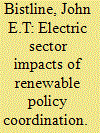|
|
|
Sort Order |
|
|
|
Items / Page
|
|
|
|
|
|
|
| Srl | Item |
| 1 |
ID:
175023


|
|
|
|
|
| Summary/Abstract |
Policies to encourage renewable electricity generation have grown at national and subnational levels. These measures are often characterized by geographical fragmentation, as jurisdictions typically select their own renewable targets without coordinating with neighboring regions. However, the literature on renewable policies has not examined the effects of cross-border interactions and coordination, especially in a multi-model comparison to examine robustness to structural and parametric uncertainties. This paper assesses the impacts of regional and international renewable policy coordination on economic, environmental, and planning outcomes in the North American power sector. Using a multi-model comparison with eight energy-economic models, the analysis demonstrates how prospective renewable mandate trade formulations impact power sector outcomes like capacity planning decisions, costs, emissions, trade, and infrastructure investments. Model results suggest that renewable policy coordination can lower costs by up to 20% for the stringencies examined here. Fragmentation lowers gas-fired generation, but coal and nuclear are also displaced, especially when regions comply without trade. Policy costs decrease for the U.S. with higher regional and international coordination, but magnitudes vary by model. Restricting coordination leads to higher capacity investments, and absent incentives to enhance efficiency, grids do not share resources to balance variability. Transmission investments and trade are highest with international policy coordination.
|
|
|
|
|
|
|
|
|
|
|
|
|
|
|
|
| 2 |
ID:
132681


|
|
|
|
|
| Publication |
2014.
|
| Summary/Abstract |
Economists traditionally view a Pigouvian fee on carbon dioxide and other greenhouse gas emissions, either via carbon taxes or emissions caps and permit trading ("cap-and-trade"), as the economically optimal or "first-best" policy to address climate change-related externalities. Yet several political economy factors can severely constrain the implementation of these carbon pricing policies, including opposition of industrial sectors with a concentration of assets that would lose considerable value under such policies; the collective action nature of climate mitigation efforts; principal agent failures; and a low willingness-to-pay for climate mitigation by citizens. Real-world implementations of carbon pricing policies can thus fall short of the economically optimal outcomes envisioned in theory. Consistent with the general theory of the second-best, the presence of binding political economy constraints opens a significant "opportunity space" for the design of creative climate policy instruments with superior political feasibility, economic efficiency, and environmental efficacy relative to the constrained implementation of carbon pricing policies. This paper presents theoretical political economy frameworks relevant to climate policy design and provides corroborating evidence from the United States context. It concludes with a series of implications for climate policy making and argues for the creative pursuit of a mix of second-best policy instruments.
|
|
|
|
|
|
|
|
|
|
|
|
|
|
|
|
| 3 |
ID:
119835


|
|
|
|
|
| Publication |
2013.
|
| Summary/Abstract |
This paper provides the first willingness-to-pay (WTP) estimates in support of a national climate-change policy that are comparable with the costs of actual legislative efforts in the U.S. Congress. Based on a survey of 2034 American adults, we find that households are, on average, willing to pay between $79 and $89 per year in support of reducing domestic greenhouse-gas (GHG) emissions 17% by 2020. Even very conservative estimates yield an average WTP at or above $60 per year. Taking advantage of randomized treatments within the survey valuation question, we find that mean WTP does not vary substantially among the policy instruments of a cap-and-trade program, a carbon tax, or a GHG regulation. But there are differences in the sociodemographic characteristics of those willing to pay across policy instruments. Greater education always increases WTP. Older individuals have a lower WTP for a carbon tax and a GHG regulation, while greater household income increases WTP for these same two policy instruments. Republicans, along with those indicating no political party affiliation, have a significantly lower WTP regardless of the policy instrument. But many of these differences are no longer evident after controlling for respondent opinions about whether global warming is actually happening.
|
|
|
|
|
|
|
|
|
|
|
|
|
|
|
|
|
|
|
|
|